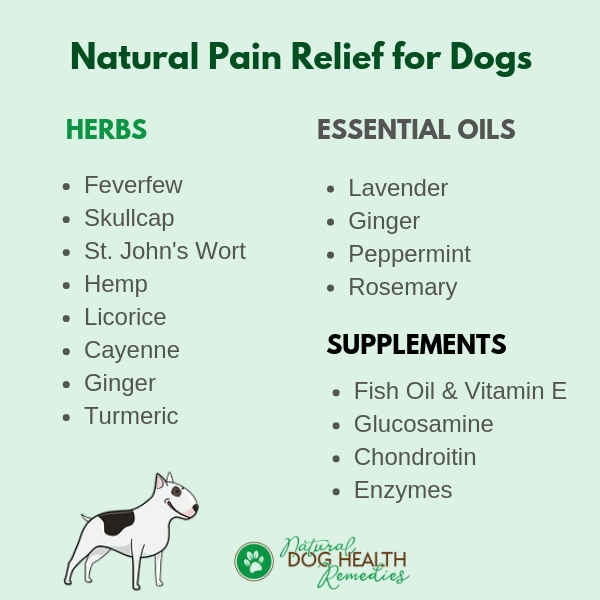Herbal Pain Remedies for Dogs
(FTC Disclosure: If you make a purchase via a link on this page, I may receive a small commission, at no added cost to you.)

Overview
Just like us, dogs suffer from aches and pains from time to time. The pain may be acute (e.g. from trauma or an injury), or chronic (e.g. joint pain). As our dogs age, it is more likely that they will develop degenerative joint pain and osteoarthritis.
Conventional dog pain medications include the use of NSAIDs (non-steroidal anti-inflammatory drugs) and corticosteroids. These drugs usually come with a list of adverse side effects, so more and more dog parents are seeking out a milder and safer approach to control dog pain.
Do remember that as a general rule, herbs and supplements take longer to act, and may not have the depth of activity that conventional medicines do. BUT, they are typically safer, non-addictive, and tend to have a broader spectrum of activity, i.e. they may help to relieve several kinds of pain.
This page looks at:
- Useful Herbal Pain Remedies for Dogs
- Essential Oils as Dog Pain Relief Remedy
- Do Supplements Help Relieve Pain in Dogs?
- Other Natural Dog Pain Relief
Useful Herbal Pain Remedies for Dogs
As home remedies for dog pain, there are quite a few effective herbs that are safe to use with dogs.
Feverfew
Feverfew is anti-inflammatory and is one of the most commonly used herbal pain remedies for people suffering from migraine and arthritis.
The good news is, this herb is effective in relieving pain in dogs (and cats) as well! In fact, this herb is a useful alternative to aspirin for cats (aspirin is toxic to cats).
To use feverfew as a pain remedy, use a tincture or tea. Use 12 drops of the tincture or 1/2 teaspoon of a strong tea for each 20 lb. of the dog's body weight, 2 times a day. Give the tincture or tea with meals.
Skullcap
Skullcap is an herb that is good for soothing nerve pain. It is commonly used to relieve pain resulting from nerve-related injuries or diseases, especially when combined in equal parts with St. John's wort.
An alcohol tincture can be used for this purpose. The following dosage can be fed to the dog for up to one week:
For each 20 pounds of the dog's body weight, combine:
- 12 drops of skullcap
- 12 drops of St.-John's Wort
Feed 12 drops (per 20 lb.) of the mixture to the dog 2-3 times a day.
St.-John's Wort
St.-John's Wort is effective in reducing pain brought on by injuries where the muscles, joints, or nerve endings have been bruised or crushed.
Topically, a tincture, oil infusion, or salve can be applied to the affected areas.
Internally, a tincture of the herb can be used in combination with skullcap (see above).
Hemp
 No, I am not suggesting that you give pot to your dog. I am talking about CBD Hemp oil.
No, I am not suggesting that you give pot to your dog. I am talking about CBD Hemp oil.
Hemp has powerful antioxidant and anti-inflammatory properties, and research shows positive results in its pain relieving power. You can read all about it here.
Licorice
Licorice contains a compound called Glycyrrhizin (don't ask me how to pronounce it), which has a similar chemical structure to that of natural corticosteroids released by the adrenal glands.
Because of the "G" compound, Licorice is an effective anti-inflammatory and is one of the many natural herbal pain remedies that can relieve pain without compromising the body's immune system. (Four-paws-up for Fido!)
To alleviate pain and reduce joint swelling resulting from arthritis, an oil infusion of licorice can be used topically on the affected areas.
Cayenne
The compound in this herb, capsaicin, has the capacity to block pain and increase circulation. In addition, it can activate the body's own anti-inflammatory mediators at the site where the herb is applied.
A cream or ointment of this herb is perhaps one of the most frequently used topical herbal pain remedies for treatment of stiff or arthritic joints.
Such cream or ointment can be used on dogs as well, but make sure that the dog doesn't lick it off - it can be hot and spicy! (Use an Elizabeth collar if necessary.)
Ginger
Fresh ginger's antispasmodic property makes it a good herbal pain remedy for stomach pain, and lower back pain. Used topically, ginger can be made into a poultice for the treatment of muscle pains and strains.
Turmeric
This wonder herb's anti-inflammatory effect is said to be comparable to those of cortisone. Turmeric is effective in treating arthritis and it can be safely fed to dogs (just sprinkle some of the dried herb on their food) as a dietary supplement.
Read more about the benefits of turmeric to dogs here.
Yucca
One main constituent of yucca, saponin, has anti-inflammatory actions. It also stimulates the body to produce its own cortiocosteroids and corticosteroid-related hormones.
Yucca is particularly effective when used in combination with alfalfa and licorice.
Using yucca to relieve pain and inflammation resulting from arthritis, therefore, is safer than using synthetically produced drugs such as prednisolone.
Having said that, do not use yucca internally in large doses or over an extended period of time, because it may irritate the lining of the GI tract. This may in turn cause vomiting and bloating.

Commercial Herbal Pain Remedies
This herbal formula contains guggul (an Ayurveda herb that has powerful anti-inflammatory properties), cayenne, alfalfa, ginger, and astragalus. It is very effective in relieving pain and calming joint inflammation in dogs.
This herbal formula contains turmeric, ginger, rosemary and more, all of which can relieve the occasional discomfort and pain brought on by sore muscles, joint pain, etc.
Another commercial liquid herbal remedy which is an effective pain relief is:
This formula contains pain-relief herbs such as cayenne, sarsaparilla, devil's claw, and burdock root. Its overall properties are similar to cortisone, giving it anti-inflammatory characteristics.
Additionally, these herbs have antioxidant properties which help remove free radicals from the body. The herbs in this formula work synergistically to remove calcium deposits from the joints, relieve joint pain, and reduce free radicals from the body. This formula also has blood purification and organ-toning functions.
Essential Oils to Relieve Pain in Dogs
Essential oils of lavender, peppermint, rosemary, ginger, and eucalyptus also are used traditionally as herbal pain remedies.
Put 5-6 drops of any one of these essential oils in one ounce of a carrier oil such as olive oil or sweet almond oil.
Shake well and then use the oil mixture as a massage oil for your dog. Rub it into the painful, swollen joints to alleviate arthritis pain and inflammation.
(Pssst! If you are interested in using essential oils with your dog, here is a useful eBook for you!)
Do Supplements Help in Relieving Dog Pain?
Regular use of supplements can also relieve chronic pains, but they are best used as preventative measures against chronic pains caused by arthritis.
Glucosamine/chondroiton and MSM supplements are effective in dogs for the relief of arthritis symptoms.
Enzymes (in particular proteolytic enzymes or proteases), if given in between meals, can work systemically to fight inflammation and joint pain. See this page for more information.
High doses (1000 mg/10 lb) of fish oil can be given to dogs with arthritis. The oil's anti-inflammatory properties are beneficial for arthritis.
When giving your dog fish oil, make sure to give him extra vitamin E, as increased levels of oil in the diet increase the body's need for that vitamin.

Other Alternative Dog Pain Relief Remedies
Besides herbal pain remedies, there are other alternative treatments for dog pain as well. Many dog owners are now turning to the following alternative treatments for dog pain relief:
Homeopathy
Homeopathic remedies are effective in relieving both acute and chronic pain in dogs.
But to obtain quick relief, the right remedy has to be chosen based on the various symptoms expressed by the dog. In this regard, it is generally easier to choose a right remedy for acute pain resulting from injuries since the symptoms are relatively similar and easy to observe.
For chronic pain that is secondary to underlying health problem(s) such as arthritis and hip dysplasia, it is more difficult and it's best to consult with a homeopathic veterinarian.
Here is a list of homeopathic remedies that can provide quick relief to acute pain resulting from injuries:
Arnica montana (Arnica)This homeopathic remedy is best known for its effectiveness in alleviating muscle pain, strains, sprains and other blunt traumas that result in bruising.
Dogs that need Arnica are usually in great pain (as a result of an injury) and they tend to be restless and afraid to be touched.
Bellis perennis (Daisy)This homeopathic remedy is rather similar to Arnica and is used for treating bruising and pain in internal organs. It is also effective in relieving pain after surgery or childbirth.
As in Arnica, dogs that need Bellis do not want to be touched because of the pain.
Hypericum perforatum (St.-John's Wort)This remedy is very effective in treating nerve injuries and will relieve pain caused by painful lacerations that involve areas with a lot of nerve endings, for dogs that will be the paws, teeth, gums, tongue and the tail. Of course, injuries to the brain and spinal cord will also respond well to hypericum.
Calendula officinalis (Marigold)The homeopathic remedy of Calendula is excellent at relieving pain of wounds and lacerations, and at the same time, it stimulates healing. It is particulalry effective for injuries involving torn muscles.
Ledum palustre (Marsh tea; Wild rosemary)This remedy is used specifically for puncture wound, such as insect bites and stings, or injuries to the eyes. It can relieve pain and swelling quite dramatically.
Ruta graveolens (Ruta) (Rue)This remedy is also effective for joint pains and injuries, especially to tendons, but bone bruises and sprains may also benefit from ruta. Dogs needing this remedy are not sensitive to touch but are somewhat irritable.
An Effective Homeopathic Remedy for Dog Pain Relief
This homeopathic remedy is good for relief of discomfort in muscles, tendons, and joints or to relieve discomfort caused by uric acid and calcium deposits.

Acupuncture
In addition to herbal pain remedies, acupuncture is another complementary treatment that is effective in relieving both acute and chronic pains.
Veterinary acupuncture is now practiced by some holistic vets. Just like acupuncture for people, dog acupuncture helps to relief dog pain naturally without side effects.
If you are searching for a vet that can give acupuncture treatments to your dog, go to International Veterinary Acupuncture Society.
Natural Anti-Inflammatories for Dogs
Also be sure to read this article on natural anti-inflammatories (herbs, supplements, essential oils, foods) for dogs.
C.J. Puotinen, Natural Remedies for Dogs and Cats (Keats Publishing, 1999).
M.L. Wulff-Tilford and G.L. Tilford, Herbs for Pets (Bowtie Press, 1999).
D. Hamilton, Homeopathic Care for Cats and Dogs (North Atlantic Books, 1999).
R.H. Pitcairn, The Complete Guide to Natural Health for Dogs and Cats (Rodale, 2005).





